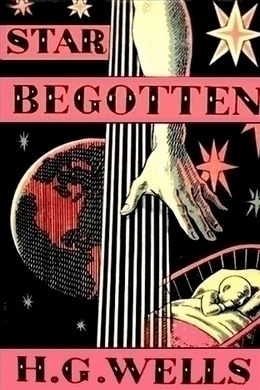
-
EPUB 215 KB
-
Kindle 234 KB
-
Support epubBooks by making a small $2.99 PayPal donation purchase.
This work is available for countries where copyright is Life+70 or less.
Description
In The War of the Worlds, H. G. Wells imagined aliens from Mars descending to Earth with violent intentions. In Star Begotten, the suspicion arises that the Martians may have returned - this time using cosmic rays to alter human chromosomes. The protagonist Joseph Davis, an author of popular histories, grows fearfully obsessed with rumors of the Martian plan. He considers the possibility that mutation may have already occurred, and that his child, his wife, and even he may already be Martians. An ironic and often comic novel, Star Begotten portrays discoveries in evolutionary biology and contemplates the benefits as well as the horrors of mutation.
145 pages with a reading time of ~2.25 hours (36432 words), and first published in 1937. This DRM-Free edition published by epubBooks, 2014.
Community Reviews
There are currently no other reviews for this book.
Excerpt
This is the story of an idea and how it played about in the minds of a number of intelligent people.
Whether there was any reality behind this idea it is not the business of the storyteller to say. The reader must judge for himself. One man believed it without the shadow of a doubt and he shall be the principal figure in the story.
Maybe we have not heard the last of this idea. It spread from the talk of a few people into magazines and the popular press. It had a vogue. You certainly heard of it at the time though perhaps you have forgotten. Popular attention waned. Now the thing flickers about in people’s minds, not quite dead and not quite alive, disconnected and ineffective. It is a queer and almost incredible idea, but yet not absolutely incredible. It is a bare possibility that this thing is really going on.
This idea arose in the mind of Mr. Joseph Davis, a man of letters, a sensitive, intelligent, and cultivated man. It came to him when he was in a state of neurasthenia, when the strangest ideas may invade and find a lodgment in the mind.
The idea was born, so to speak, one morning in November at the Planetarium Club,
Yet perhaps before we describe its impact upon Mr. Joseph Davis in the club smoking-room after lunch, it may be well to tell the reader a few things about him.
We will begin right at the beginning. He was born just at the turn of the century and about the vernal equinox. He had come into the world with a lively and precocious intelligence and his ‘quickness’ had been the joy of his mother and his nurses. And, after the manner of our kind, he had clutched at the world, squinted at it, and then looked straight at it, got hold of things and put them in his mouth, begun to imitate, begun to make and then interpret sounds, and so developed his picture of this strange world in which we live.
His nurse told him things and sang to him; his mother sang to him and told him things; a nursery governess arrived in due course to tell him things, and then a governess and a school and lot of people and pictures and little books in words of one syllable and then normal polysyllabic books and a large mellifluous parson and various husky small boys and indeed a great miscellany of people went on telling him things and telling him things. And so continually, his picture of this world, and his conception of himself and what he would have to do, and ought to do and wanted to do, grew clearer.
But it was only very gradually that he began to realize that there was something about his picture of the universe that perhaps wasn’t in the pictures of the universe of all the people about him. On the whole the universe they gave him had an air of being real and true and just there and nothing else. There were, they intimated, good things that were simply good and bad things that were awful and rude things that you must never even think of, and there were good people and bad people and simply splendid people, people you had to like and admire and obey and people you were against, people who were rich and prosecuted you if you trespassed and ran over you with motor cars if you did not look out, and people who were poor and did things for you for small sums, and it was all quite nice and clear and definite and you went your way amidst it all circumspectly and happily, laughing not infrequently.
Only–and this was a thing that came to him by such imperceptible degrees that at no time was he able to get it in such a way that he could ask questions about it–ever and again there was an effect as though this sure and certain established world was just in some elusive manner at this point or that point translucent, translucent and a little threadbare, and as though something else quite different lay behind it. It was never transparent. It was commonly, nine days out of ten, a full, complete universe and then for a moment, for a phase, for a perplexing interval, it was as if it was a painted screen that hid–What did it hide?
